Pendulum impact testers for tests on plastics 5,5J HIT5,5P
Pendulum impact testers for tests on plastics 5,5J HIT5,5P
Industries
-
Predominantly plastics
Pendulum impact testers for tests on plastics 5,5J HIT5,5P
Max. energy
-
50 joules
Type of test
-
Charpy
-
Izod
Pendulum Impact Testers for Plastics Testing – Accurate, Reliable and Operator-Friendly
In addition to tensile and flexure tests, Charpy impact tests are the most frequently performed mechanical tests in the polymer industry. ZwickRoell’s HIT series pendulum impact testers offer a high-precision, cost effective solution.
Pendulum impact testing of plastics
Standard-compliant testing according to Charpy, Dynstat, and Izod and tensile impact tests, Method A/B with the HIT series of pendulum impact testers—be sure to hit your target with ZwickRoell!
-
HIT pendulum impact testers automatically identify the pendulum in use, ensuring that measured values are always determined in the correct range and in accordance with the standard in use.
-
A world first is the use of carbon double rods for the pendulum. This provides a high level of stiffness in the impact direction and a strong concentration of masses at the point of impact.
-
Each pendulum is equipped with a quick-change device. Pendulums can be changed quickly and without the need for tools.
-
The optional pendulum disc brake is virtually wear-free.
-
Operator convenience is a prominent feature of the HIT pendulum impact testing systems. Easy-to-reach controls, on the same level wherever possible, help avoid user fatigue.
-
The electronics contain a high-resolution digital encoder for accurate measurement of the impact angle. An RS232 interface is available for connection to laboratory data-management systems. A PC can be connected via a USB plug-and-play interface.
All test-related settings are grouped logically and are separated from higher-level system settings. The operator is guided through test configuration step by step. The stored test configuration can be easily exported and transferred to other devices.
Integrated user management reduces the number of operator input options to a minimum. Users see only what is important to them so they can focus on the task at hand right from the start.
Thanks to the new, standardized operating philosophy, the user can easily switch between the device and the PC.
The process of designing a pendulum impact tester for consistently low natural vibrations begins in the vicinity of the specimen, with the pendulums and fixtures.
Operator convenience is a prominent feature of the HIT pendulum impact testing systems. Everything is within an arm's reach and operational controls are at a uniform height.
The welded table frame guarantees maximum stiffness, while wide-based leveling feet ensure firm, stable support. The support table’s positioning stops line up perfectly with the pendulum impact tester's frame. The HIT pendulum impact tester base plate is constructed with vibration-damping metal casting, and the ratio of its mass to the pendulum mass complies with standard requirements. Three sturdy, lockable leveling-feet provide secure footing and enable horizontal alignment of the instrument. This means that you can be sure of obtaining reliable test results regardless of local conditions.
Just as the mass of a calibrated weight is engraved on it, each ZwickRoell pendulum carries its data with it in the form of electronically readable pendulum coding.
The pendulum identifies itself to the electronics through standard, type of test, energy capacity, starting angle and other physical data. Also stored in the instrument are data on air and bearing friction. Erroneous measurements are thus eliminated.
Freely selectable starting angles enable optimum test parameters, for example impact speed and energy loss at impact After the test the pendulum is automatically captured and returned to the starting position by a motor drive.
To protect operators from flying specimen fragments or prevent contact with a falling pendulum ZwickRoell has a range of recommended solutions.
-
During Charpy tests the safety guard on the Charpy fixture ensures that specimen remains stay within the pendulum impact tester.
-
The swiveling safety housing enables optimum access, for example during Izod tests.
-
The electrically interlocked safety device eliminates air supply during a test and provides maximum protection from shattering specimens. Two-handed operation is required to release the pendulum, eliminating the possibility of reaching into the pendulum impact tester during a test.
ZwickRoell testing software provides a clear visual presentation of all impact characteristics recorded in a results table and graph, allowing you to produce comprehensive statistical evaluations.
Data is easily and safely stored:
-
In a report prepared in accordance with the standard
-
In a test series contained in testXpert III
-
Automatically exported to your database
Instrumented impact testing allows additional information on material characteristic values and properties to be obtained, and fracture mechanics investigations and automated fracture evaluations to be performed. Instrumented pendulums and expanded electronics are available for high-accuracy recording of the high-speed processes involved in breaking through a specimen.
At low temperatures impact strength is a critical property of a material. ZwickRoell offers a temperature-conditioning box and magazine for cooling specimens. For testing at low temperatures the specimens are first conditioned in a cooling box. The magazine with the specimens is then attached to the specimen feeder, which is fastened to the HIT pendulum impact tester. This way the specimens can be quickly and conveniently removed and tested.
Plastics Impact Testing Applications
Specimens can be loaded in variety of ways by pendulum impact testers.
-
Charpy tests: ISO 179, ASTM D6110
-
Izod tests: ISO 180, ASTM D256, ASTM D4812
-
Impact tensile tests: ISO 8256 Methods A and B, ASTM D1822
-
Dynstat impact bending tests: DIN 53435
Charpy fixtures consist of a massive cast base. Test-specific items such as supports and anvils are selected according to the range of specimens.
Test results are significantly influenced by the roughness and radius of the anvils, which are fully precision CNC manufactured, with 100% measurement. ZwickRoell does not supply single-part anvils, for which it is difficult to achieve dimensional accuracy. The location of the anvil relative to the tup is ensured via an optional jig during installation.
As anvils are subject to greater wear than supports, cost-effective replacement of two-part anvils independently of other accessories is available. Quick-change adapter plates ensure that the impact point is matched to the specimen width in the impact direction, while the specimen thickness (vertical direction) is accommodated via suitably dimensioned supports with alignment pins to ensure accurate insertion.
Optionally available for the Charpy fixture are a pivoted safety shield and alignment units to enable correct positioning at the center of impact, using either the notch or the front edge of the specimen.
Advantages
-
Fast fixture changes
-
Precision manufacture of anvils, with documented 100% dimensional accuracy verification
Two types of Izod fixture can be used. The manual fixture is equipped with a fine-threaded lead-screw, allowing precisely controlled gripping of soft, hard or clamping-sensitive specimens.
The pneumatic fixture is ideal where high throughput is required or temperature-conditioned specimens are to be tested. It also enables excellent reproducibility when clamping-sensitive materials are being tested.
Quick clamping via a switch on the fixture itself minimizes the time from removal of the specimen from the temperature-controlled area to actual testing.
Both fixtures are equipped with a centering unit to ensure that the specimen is always positioned in the plane of the notch root.
Adjustment to suit specimen width in the impact direction is via quick-change inserts with lateral guides.
Advantages
-
Rapid specimen centering and gripping
-
Fine adjustment of gripping force
-
Fast testing with pneumatic fixture
-
Constant gripping force enables high reproducibility
For impact tensile tests the specimen and yoke are aligned in a jig and clamped together.
Depending on the test method in use, the specimen plus yoke are clamped in either the pendulum or the impact tensile fixture.
The appropriate templates are used to set up for the various ISO and ASTM specimen types.
For tests to ISO 8256, Method A, a yoke is attached to the shoulders at one end of the specimen. The other end of the specimen is gripped in the impact tensile fixture. The free end of the specimen plus the yoke is struck off by the pendulum hammer. Yokes are available with masses from 15g to 120g.
For tests to ISO 8256 Method B and ASTM D1822 one end of the specimen is clamped in a specially designed pendulum hammer; a yoke is attached to the other end, which hangs free. In the test the yoke is stopped by the impact tensile fixture, while the pendulum plus specimen continues its travel.
An impact tensile fixture is available for each standard. Yokes are available from 15g to 120g.
Advantages
-
Rapid changeover to either test method
-
Precise specimen clamping and alignment
HIT pendulum impact testers can also be equipped for Dynstat impact tests to DIN 53435. A Dynstat fixture and the five standardized pendulums cover the range of application.
Technical Overview
| Type | HIT 5.5P | |
| Item No. | 1064347 | |
| Use | with PC | |
| Potential energy | 5.5 (4.06 ft lbf) | J |
| Dimensions | ||
| Overall height, approx. | 990 | mm |
| Overall width, approx. | 870 | mm |
| Overall depth, approx. | 573 | mm |
| Weight | ||
| Without tools, approx. | 136 | kg |
| With typical tools, approx. | 150 | kg |
| Test results, numerical | Impact energy [%], impact energy [J], impact strength [kJ/m2] | |
| Units | SI, metric, Anglo-American | |
| Control functions | Friction correction, pendulum vertical position, swing duration, instrument data display | |
| Pulse resolution | 0.018 | ° |
| Interfaces | •Ethernet port to connect a PC •2 x USB port to connect a printer or USB stick or USB Multiplexer •2x RS232 interface |
|
| Electrical connection | 100 … 240, 50/60, 70 | V, Hz, W |
| Compressed air | 6, dry, oil free (required only for compressed-air driven accessories) | bar |

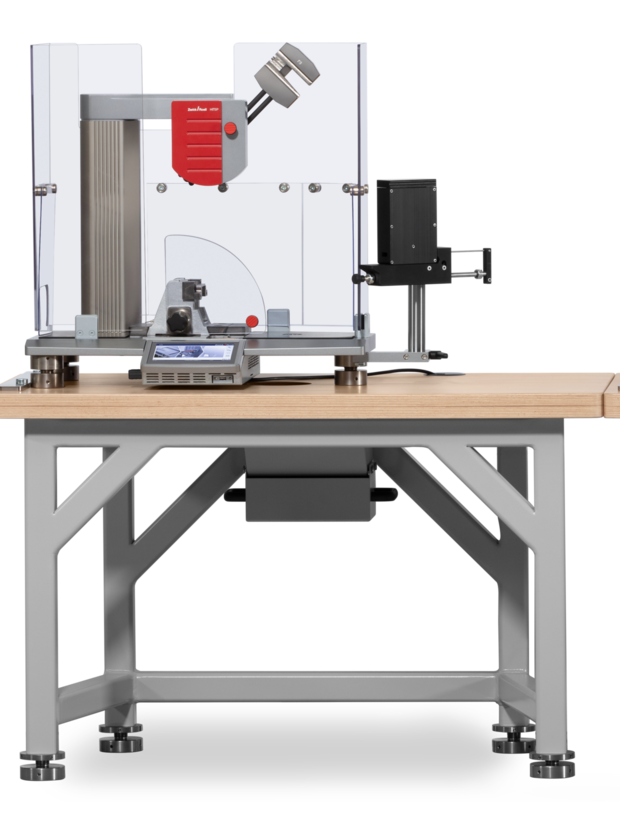
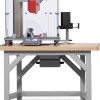

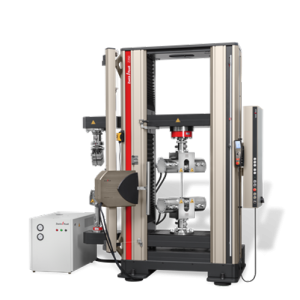
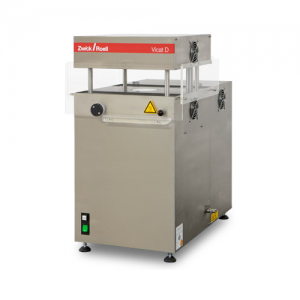
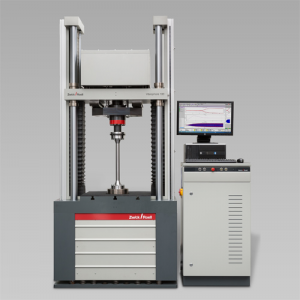
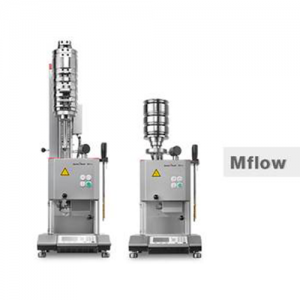
Reviews
There are no reviews yet.